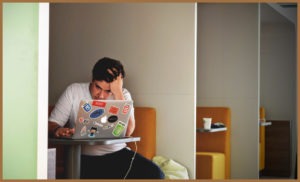Growing up with autism has definitely had its fair share of highs and lows. For example, when I was younger most people didn’t fully understand my particular situation, so often avoided me or distanced themselves just far enough away that I often felt extremely alone … On the other hand I got free access to the fast lane at Alton Towers, so you know, swings and roundabouts.
However, I always thought that one of the positive things about my condition was that, being blissfully unaware of social situations would mean I was less phased by social interactions and so free from any form of additional social disorder, like anxiety. Sadly this couldn’t be further from the truth.
How Can You Tell if Someone has Anxiety?
It’s generally thought that 14% of the modern population suffer from some form of anxiety and, while I’m not saying any one set of people is more fortunate than the other, when this is compared to the 49% of people with autism who have it, I kind of get the feeling that our community drew the short straw.
Interestingly, it is those who are more independent within the autism community that are more at risk of anxiety as, due to a higher awareness of our social surroundings, we are left in a scenario where the more aware of other people’s opinions we have become, the more anxious we are about standing-out due to our differences (and here I was thinking we got off easy).
Furthermore, like autism, anxiety is an invisible disorder and, while in most cases people with it will be acutely aware, it can be tougher to spot in people who like to bottle their feelings up (which is usually where the autism community excels). So how do you spot anxiety without the person telling you? Well, as the ancient Chinese military strategist, Sun Tzu once said ‘know your enemy’.

What Are the Different Forms of Anxiety?:
Up until this week, I honestly thought that there were only two forms of anxiety: The scared form of anxiety, where you feel a little nervous before a big moment, and the distressed kind of anxiety when that moment has gone wrong and now you don’t know what to do. This, as it turns out, isn’t even close to the reality, as It only takes a moment’s search to see the various types of anxiety that exist including:
- Social Anxiety: the fear of standing out /being a part of social situations.
- Obsessive Compulsive Disorder (OCD): The inability to rid one’s mind of unpleasant thoughts (usually resulting in some sort of repetitive behaviour with the aim of satisfying said thoughts).
- General Anxiety: A totally natural feeling which can occur when you are nervous.
- Separation Anxiety: This usually hits hardest when a person is taken away from a place or person. In the case of people with autism, this can also apply to being separated from a routine (This is one of the major forms of anxiety that myself and many other people on the spectrum have).
- Physiological Anxiety: A form of anxiety which is caused from feeling extreme emotion. For example, every year I get so excited for Christmas that I usually spend the 24th with my head in a toilet throwing up (sorry for that image).
- Panic Anxiety: This one is difficult to explain, but it is basically comes down to spates of anxiety which seem to hit without rhyme or reason. Like when you wake up in the night scared with no recollection of what the dream even was, only this happens during the day time.
This is just a small selection of the different types of anxiety, but I believe that even by using this small sample size, it is clear to see that the cause and effects of anxiety are highly varied.
But now you know what anxiety looks like, let’s talk about how to get rid of it.

How to Help Autistic People with Anxiety (Possibly):
It’s recommended (by people much smarter than I) that to help calm the effects of anxiety on people with autism, we should be encouraged to practice our social skills until we realise that, in reality, everyone is a bit of a failure so we might as well get over it (ok, so the articles I have read use much more delicate wording than this, but the gist is the same).
However, I’m not entirely convinced this is correct. In the past, taking this approach, only helped to strengthen my Separation Anxiety. As, by meeting new people to resolve my anxiety of meeting new people, I am often reminded of how uncomfortable it makes me feel. This essentially reminds my brain that next time I have the option to go out, I should instead choose to stay home, throw on Netflix and refuse to pick up the phone, unless I feel it is entirely necessary.
Granted this isn’t really a solution to anything (as much as I wish it was) but I just can’t bring myself to endorse something which doesn’t work for me personally. That’s not to say there aren’t great anxiety management techniques though (because there are!), it’s just my way of saying that when it comes to a full blown cure, I seriously doubt that such a thing exists (yet).

World Mental Health Day
It’s that last point though, which makes World Mental Health Day such an important date. As it raises awareness of disorders like anxiety, so that the researchers and support workers realise just how much their help is needed (and appreciated).
World Mental Health Day is also an important day because it reminds me, and the many others affected by anxiety, that, though there are days where we can feel like a failure for not wanting to go out, it is not our fault and it won’t last forever.
World Mental Health Day let’s myself and others know that sometimes it’s okay to stay in. But it also lets us know that, when we are ready and we are finally confident enough to leave the house, the world won’t have forgotten about us. As such, we will know that we never had to feel anxious in the first place and we can start letting things return back to normal (whatever that may mean).

Carry on the Conversation:
That’s all I have to say for today though, now I want to hear from you. Do you have any experience of having anxiety (both big and small)? What advice do you have for people currently suffering?
As always you are free to share your stories in the comments below and I will do my best to reply asap.
If you’re looking for a more direct (and private) discussion, email me at autisticandunapologetic@gmail.com
Just a reminder that you can sign up to my newsletter in the sidebar or follow me on twitter @autismrevised for regular updates from the site.
If you liked what you read today, why not give the site a like on facebook? You have no idea how much I appreciate the support.
Thanks for reading and I will see you again, next Saturday, for more thoughts from the spectrum.


